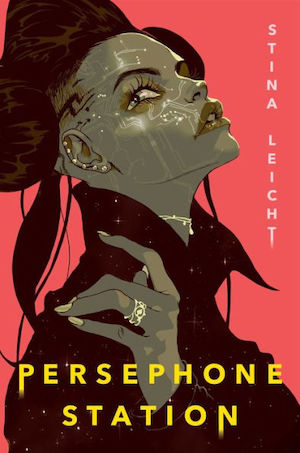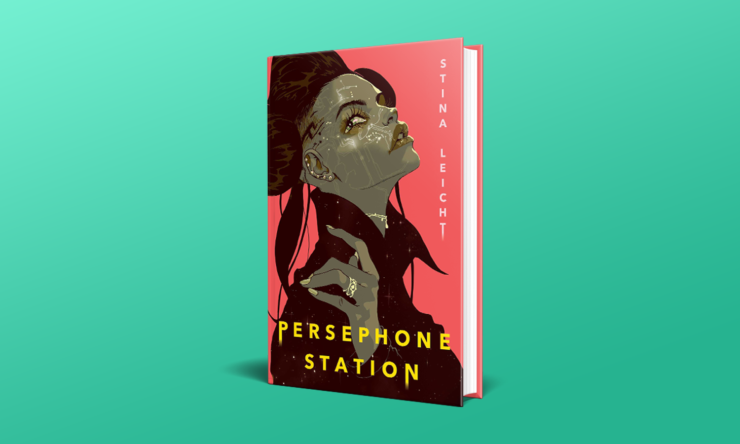In a real way, the western and science fiction are made for each other, and have been for decades. Long before things like Firefly or Outland or Star Wars, the very term “Space Opera” is a derivation from the term for romances of the Wild West, “Horse Opera”. The DNA of westerns is in many SF stories where there are frontiers, conflicts between “civilized” and “rough” areas, the psychology and anthropology of communities very much on their own for good and for ill against the wilderness.
In this day and age though, we can work this connection further. The position of women in westerns, and frankly, a lot of space opera, is not so great. Where are the stories of women doing things on the frontier, riding the star winds, trying to do what’s right? Where are the Wild West Heroines, or even grizzled veterans just trying to make a living and get caught into a greater cause, despite themselves?
And so we come to Stina Leicht’s Persephone Station.
I should start off with the note that the title itself is something of a misnomer. The action almost entirely takes place on the planet Persephone, the space station of the title plays a small role in the narrative. That aside, the colony planet of Persephone interrogates a lot of the frontier tropes and ideas, and provides us the setting for the conflict. It only now occurs to me, since I am not as well versed in westerns as I wish I was, but the railroad companies and magnates of the 19th century are the model and forebear of overbearing corporations seen in a lot of modern space opera1 such as Persephone Station. So instead of James J Hill, we get Serrao-Orlov, the corporation which settled Persephone and knows a few secrets that most of the planet has no idea about, but that thanks to POV, we the reader know: there are living indigenous inhabitants of the planet. This uneasy secret and peace between the corporation and the Emissaries is broken after a bullet-mediated corporate leadership change, and the new corporate policy is simply to wipe them out. The universe thinks they are all long dead; the new corporate leadership has decided to end them entirely. The colonists never knew they were there, and now will never know.
Fortunately for the Emissaries, they have a friend in Rosie, who owns a bar frequented by a merc named Sabrina ‘Angel’ De La Raza. Angel and Rosie, along with a band of soldiers, may be just the right people to defend the Emissaries against the corporation. A hard bitten group of mercenaries who have seen too much, with one more job that might offer a chance at redemption, and to strike against corporate greed and genocide? Angel and her team are on board. And so a confrontation is thus set up for the fate of the native inhabitants of the planet. The stakes are only increased when the power and what the Emissaries have to offer are revealed.
Buy the Book


Persephone Station
The novel is replete with this sort of framing and viewpoint, borrowing western and frontier story motifs and character types, give them a feminist chassis and point of view, and unleash them on the plot. Frontier planet where the wilderness is considered highly dangerous, and not to be explored? A settlement with some very rough edges and hardbitten people to inhabit it? Corporate politics meddling in local affairs? The Way of the Gun? Persephone definitely shares notable DNA with a Wild West mining town struggling with a variety of issues, often with violence, even as there are those who won’t engage in it.
Leicht’s talent for action sequences comes really to the fore throughout the novel, the skills honed in previous novels really pay off here as Angel’s team gets themselves on the mission. The fact that the Emissaries themselves are not exactly itching for a fight and would rather use diplomacy just complicates Angel’s team and mission, when the troops start marching. Leicht goes in for a lot of the tropes (meeting in a bar, splitting the party, sudden reversals, harsh bargains, ugly choices) and gives then a shiny chrome finish. When the bullets fly, the pages especially turn. Leicht’s previous novels and taste for speed and high octane action really pay off here. I, as a reader of her previous fiction, was left wondering why she hadn’t tried her hand at this sooner.
Further, rather than making them faceless figures to stand and die, Leicht takes great pains for us to care about these ex-soldier mercenaries caught on the horns of this conflict, as well as others in the city, and also in Serrao-Orlov as well, and building the world through those characters, in sometimes unexpected ways. The novel doesn’t NEED a dive into artificial intelligences, it’s a side of a side to the main plot. But given one of Angel’s team’s deep connection to a budding artificial intelligence known as Zhang, we get some interesting speculation on bootstrapping intelligence and sentience. It does give the novel a more organic feel, the Kennedy-Zhang subplot feels like its part of another story, but due to how Kennedy develops and is revealed as a character, a whole raft of world development comes in with her via Zhang.
I suspect that the author began with characters and the world grew out of their creation, rather than the reverse, here, because this subplot and worldbuilding by character development is the hallmark of this book. We get a slice of the universe that the author has created by the backstories of the characters, making for a complex and complicated world we get spotlights on as being relevant to the persons on the page. It’s a worldbuilding technique that makes for a somewhat akin to pointillism to give the reader the ability to form the dots to a coherent whole. So, corporate shenanigans here, government agents there, background on Earth over here, veterancy of wars and battles on this side, colonization and how planets get colonists this way. It does mean that a reader looking for large infodumps on how Leicht’s space opera universe works are going to be sorely disappointed. But it does mean the world sections we do see and experience and explore are in the end character relevant and tie into the narrative. And Leicht can’t resist fun bits like naming the AI of a ship Kurosawa, or name the town that Rosie’s Bar is in West Brynner. The book really loves its inspirational source materials even as it puts them into a new framework.
Is this, you might ask, a smash the patriarchy strain of feminism, a la LR Lam and Elizabeth May’s very fun feminist space opera Seven Devils?2 Not quite, the antagonist in the Serrao-Orlov corporation, Vissia Corsini is female (and she executed a Klingon promotion to lead that corporation by taking out her predecessor, also a woman). No, Leicht has created a universe here where women are equals in love and war, violence and action, honor, and sacrifice. It is not a novel smashing the patriarchy, but rather showing a world where women get equal time and roles in the day to day business of life, as protagonists, antagonists and the reluctantly drawn in. The Emissaries are more genderfluid, but in general this is a novel of violence in a frontier world where it just so happens that the vast majority of the characters are women.
I think Persephone Station could have used a little more in different points of view to complete the circle and really make this a transcendent leap from fantasy into space opera for the author. A couple of missing points thanks to, I think, not seeing enough or certain perspectives leaves the novel for me only very very good and a great way to start 2021. Given Leicht’s style of worldbuilding and all that is introduced, and all that is left to be explored, the author certainly could put out many more novels in this verse, with or without Angel’s team. I for one would be quite eager to read them.
Persephone Station is available from Saga Press.
Read an excerpt here.
[1]See also: Martha Wells' use of corporations and colonies in the Murderbot verse. The corporate control of colonies there is very similar to what Leicht does here, although governmental bodies are more effective in Leicht's verse than in Wells. Also compare Patrick Tomlinson's In the Black, where the corporate entities basically are large aspects of the government.
[2]Off of note one, Seven Devils is much more of the story of Empire and fighting against that particular strand of tyranny. There are many oppressive systems to fight and many ways to depict those fights.











Nice summary. This book was really fun, I felt that it had an old-school feel to it (maybe the setting and the action scenes) but with more modern sensibilities. (Also I think it had enough viewpoint characters in it but that may be a matter of taste.) I wasn’t thinking of it as a western while I read it but that is a solid connection for sure.
Comment: “interrogates” seems to be used oddly in this phrase “That aside, the colony planet of Persephone interrogates a lot of the frontier tropes.” To me, at least, it brings up an image of a planet, with a rubber hose in one [incongruous] arm threatening a strangely anthropomorphized trope strapped in an uncomfortable chair.
I disagree with your statement: “Space Opera” is a derivation from the term for romances of the Wild West, “Horse Opera.”
Both terms are derived from the “opera” — a type of stage play developed in the 17th and 18th centuries in which all the dialogue is sung to orchestral accompaniment (E.g., Mozart’s “The Magic Flute,” Puccini’s “Madame Butterfly,” Bizet’s “Carmen.”) (the “musical” — stage play or movie — is its descendant). Operas feature character-driven stories that are dramatic and often tragic and have intensely emotional themes (unrequited love, thwarted love, revenge, jealousy, etc.) which enable the performers to get in a good bit of scenery chewing. The early radio serials were referred to as “soap operas” because they featured stories with similar angst-laden themes to those in operas, and were often sponsored by soap companies. Those same types of stories in an Old West setting were referred to as “horse operas” (“High Noon,” “Bonanza,” “Gunsmoke” ) When set in space, they’re called “space operas.” But the “opera” part in each iteration refers to a specific type of (melo-)dramatic, character-driven story line with heavy emotional themes. You can dress it up any way you like because “horse,” “soap,” or “space,” it’s all opera.
Quite a bit of unnecessary pedantry in the comments so far, seems to me.
@2: It’s not any different from the verb ‘question’, surely. Both can be used metaphorically.
@3: I thought that was implicit in the article; they’re both compounds extending the notion of opera (this can’t not be common knowledge), but ‘horse opera’ was presumably earlier and helped set the template.
If you are willing to read comics, a similar plot to that which is described in this article is found in Jessica Abel’s “Trish Trash: Rollergirl of Mars Omnibus.” Her book also deals with mostly female characters, has native inhabitants to a colony being fought over for extermination or preservation, and has a similar old fashioned feel to it. However, it seems to replace the Western style with the Roller Derby inspired main plot. I highly recommend Jessica Abel’s book as supplementary reading to “Persephone Station.”